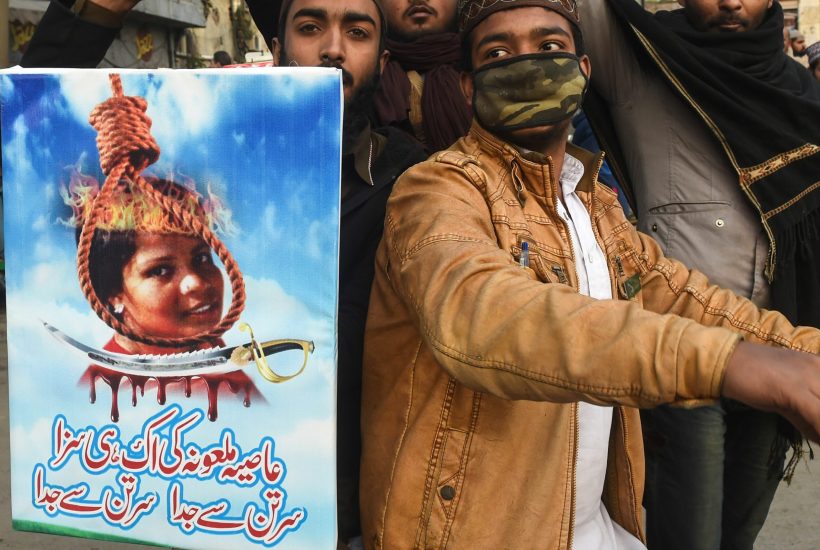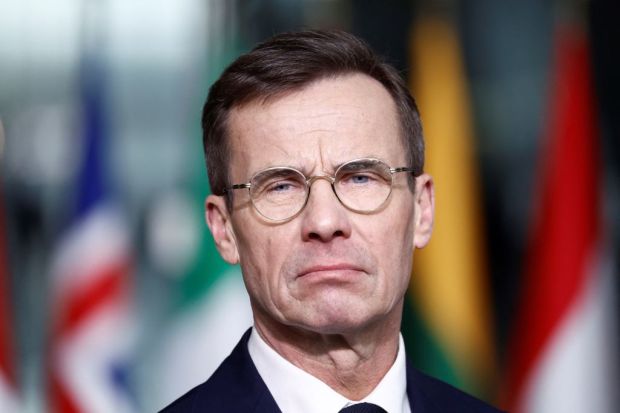An eight-year-old Hindu boy is currently in custody in the southern Punjab. He is the youngest person in Pakistan to be charged with blasphemy. The boy, accused of urinating in a local madrassa, was released last week on bail — in retaliation, a Muslim mob vandalised a local Hindu temple. Meanwhile, on Thursday, a day after the temple attack, a transgender person was arrested on blasphemy charges in Abbottabad, around 100 miles north of the capital Islamabad, for allegedly burning the Quran.
These are but the latest in an unrelenting spree of blasphemy cases, a victimless crime that carries the death penalty in Pakistan. Indeed, this punishment is reserved solely for offending Islam, with sacrilege against Hinduism, Judaism, Christianity and other religions carried out with impunity. These latest cases underline how the blasphemy law continues to be used to hunt down the most vulnerable, which could range from women demanding basic human rights to religious minorities. Even denying Islamic supremacy and claiming that all religions are equal has led to blasphemy cases, with progressive and dissenting Muslims also targeted.
Sending texts, sharing poetry, giving homework, producing films, making footballs, removing stickers and drinking water are some of the acts that have been deemed blasphemous in Pakistan. Even reading the Quran, performing Islamic rituals or calling yourself Muslim is sacrilegious if you belong to the Ahmadiyya sect, making Pakistan the only country where one can be imprisoned — or even sentenced to death — for practising Islam. Where the officially excommunicated Ahmadiyya Muslims are legally barred from practising Islam, even Shia Muslims are victims of state persecution, with efforts made in the Sunni-majority country to outlaw their beliefs as blasphemous. Before the eight-year-old Hindu was charged with blasphemy, a three-year-old Shia Muslim had been investigated for organising an Islamic gathering.
Notwithstanding the antediluvian monstrosity of sanctioning death for drawing images or burning pages, these blasphemy cases illustrate the trigger-happiness of Islamist mobs. Many of the Quran burning allegations are either fabricated or carried out by someone mentally unsound. A 12-year-old Christian girl had to flee the country after being falsely accused of tearing pages from the Quran, which were later reported to have been done by a local Islamic cleric in a bid to frame her. It is not unfair to assume the worst of the charges against the transgender person.
Trans people in Pakistan are already among the most marginalised members of society. Last month a transgender person was killed at a party in a northern town, two were murdered in a targeted-killing in central Punjab in February, while another trans person’s dead body was found in the urban centre Karachi in January. In the Khyber Pakhtunkhwa province alone, over 70 trans people have been killed in the past six years. Now they are being victimised by the blasphemy law.
Imran Khan’s response to the unrelenting surge in blasphemy cases has been to rally against the ‘Islamophobia’ in the West, where he wants to export Pakistan’s blasphemy law. In April, after weeks of violent unrest in the country over Charlie Hebdo’s Mohammed caricatures, Khan said he shared the ‘same goals’ as those demanding that France be nuked and vowed to make the West ‘scared of blaspheming’ against Islam’s prophet. The level of Khan’s hyperbole can be seen in his promise to impose trade sanctions on a country from which Pakistan takes billions of dollars worth of aid.
On cue, days after Khan’s threats, the EU passed a joint motion against Pakistan’s blasphemy law, reminding Islamabad that the programmes it financially benefits from come with obligations to ‘guarantee human rights and religious freedom’. The EU parliament cited the case of Shagufta Kausar and Shafqat Emmanual, a Christian couple on death row over allegedly sending blasphemous texts, who were duly released after the motion.
Pakistan is one of 12 Muslim-majority countries where blasphemy against Islam is punishable by death, with 20 others sanctioning prison sentences. So far there have been at least 77 extra-judicial killings in Pakistan, hundreds sentenced to death and thousands rendered homeless. Instead of urging these countries — which constitute the vast majority of the Muslim world — to shun their vicious sharia clauses, Islamic blasphemy violence has been allowed to flourish elsewhere.
Pakistan’s blasphemy law, and indeed its varying renditions across Muslim-majority countries, can only be eliminated by challenging the ideology that elevates offended Islamic sensibilities. As long as Islamic exceptionalism continues to be endorsed in the garb of protecting Muslim minorities in the West, minorities in countries like Pakistan will continue to be targeted by the gory excesses of Islamism.
Got something to add? Join the discussion and comment below.
Get 10 issues for just $10
Subscribe to The Spectator Australia today for the next 10 magazine issues, plus full online access, for just $10.




















Comments
Don't miss out
Join the conversation with other Spectator Australia readers. Subscribe to leave a comment.
SUBSCRIBEAlready a subscriber? Log in